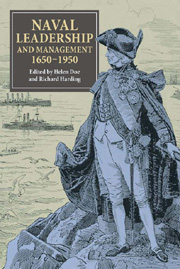Book contents
- Frontmatter
- Contents
- List of Tables
- List of Editors and Contributors
- Acknowledgements
- List of Abbreviations
- Michael Duffy: An Appreciation
- Introduction
- Leadership: The Place of the Hero
- Leadership and Organisational Frictions: Contested Territories
- Management Capability and the Exercise of Naval Power
- 5 High Exertions and Difficult Cases: The Work of the Transport Agent at Portsmouth and Southampton, 1795–1797
- 6 Forgotten or Ignored, the Officers at Invergordon:‘We are doing this for you as well you know’
- 7 ‘To Excite the Whole Company to Courage and Bravery’: The Incentivisation of British Privateering Crews, 1702–1815
- The Evolution of Management Training in the Royal Navy, 1800–1950
- Select Bibliography
- Index
7 - ‘To Excite the Whole Company to Courage and Bravery’: The Incentivisation of British Privateering Crews, 1702–1815
from Management Capability and the Exercise of Naval Power
Published online by Cambridge University Press: 05 February 2013
- Frontmatter
- Contents
- List of Tables
- List of Editors and Contributors
- Acknowledgements
- List of Abbreviations
- Michael Duffy: An Appreciation
- Introduction
- Leadership: The Place of the Hero
- Leadership and Organisational Frictions: Contested Territories
- Management Capability and the Exercise of Naval Power
- 5 High Exertions and Difficult Cases: The Work of the Transport Agent at Portsmouth and Southampton, 1795–1797
- 6 Forgotten or Ignored, the Officers at Invergordon:‘We are doing this for you as well you know’
- 7 ‘To Excite the Whole Company to Courage and Bravery’: The Incentivisation of British Privateering Crews, 1702–1815
- The Evolution of Management Training in the Royal Navy, 1800–1950
- Select Bibliography
- Index
Summary
Privateering has been viewed from various perspectives by academic researchers. Historians have tended to focus on the economic and military significance of privateering in particular nations or ports during particular wars or epochs. This not only reflects the character of a business that was generally authorised by, and in theory benefited, nation states during time of war, but also the fact that the documentary evidence underpinning most historical studies was generated by national institutions, chiefly prize courts and admiralties. Within these confines, much of the research effort has been expended on establishing the scale of privateering, generally in terms of the number of vessels commissioned and prizes taken. This has revealed a good deal about the level and impact – in quantitative terms – of private commerce-raiding undertaken in a range of contexts. Much is known, for example, about the private forces set forth by the English during the 1585–1603 and 1625–30 conflicts, the Spaniards operating out of Netherlandish ports from 1621 to 1648,2 the Scots during the 1513–1713 period,3 the French during the wars of Louis XIV, the British in the five wars in which they engaged as belligerents between 1702 and 1783, the British American colonists in the 1740s and the Americans during the 1812–14 war.
Scholars from other disciplines have adopted more theoretical approaches. Thomson, for instance, has examined privateering in the context of the monopolisation of violence at sea by nation states, a long-term gradual process that was largely accomplished by the nineteenth century.
- Type
- Chapter
- Information
- Naval Leadership and Management, 1650–1950 , pp. 123 - 140Publisher: Boydell & BrewerPrint publication year: 2012



